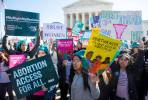Court settles narrow issue in gun debate
First of all, I want a pat on the back. I sat down last week with a copy of the U.S. Supreme Court's gun control ruling and read the entire thing: 157 printed pages, including the majority opinion, two dissents and all the footnotes.
This is not exactly literature we're talking about. District of Columbia vs. Heller doesn't grip your attention like a good thriller or engage your brain like great literature. It's a series of convoluted legal arguments, although the justice who wrote the majority opinion, Antonin Scalia, did throw in a couple of Lewis Carroll references.
What I found most interesting about the 5-4 decision is how low we've apparently set the bar for "historic" or "monumental," as the ruling repeatedly has been described. Don't be fooled. In fact, the Supreme Court ruling is far from life-changing stuff.
The ruling does clarify a long-disputed legal point: Does the Second Amendment apply to individual Americans or only to members of a "well regulated militia"?
Gun control advocates have argued that the amendment's right to "keep and bear arms" applies only to members of a militia -- a volunteer military organization common in the colonial era. If this is indeed the case, then local, state and federal governments could enact laws precluding individuals from owning firearms.
But Scalia argued that the Second Amendment does apply to individual Americans. In other words, the majority opinion concurred with what most Americans and an overwhelming majority of government jurisdictions have long understood to be the law.
The ruling may have a feel-good effect for pro-gun people, but it should not be characterized as "monumental," because Scalia, perhaps pulling his punches to secure a majority vote, failed to take the ruling any further. On the contrary, he said that most gun regulation -- aka gun control -- is just fine and dandy.
This aspect of the ruling is worth quoting at some length:
"Nothing in our opinion should be taken to cast doubt on longstanding prohibitions on the possession of firearms by felons and the mentally ill, or laws forbidding the carrying of firearms in sensitive places such as schools and government buildings, or laws imposing conditions and qualifications on the commercial sale of arms."
As a result, the high court ruling applies only to laws that dictate an all-encompassing ban on handgun ownership. This affects Washington, D.C., where the case originated, as well as Chicago and San Francisco. It basically has no effect anywhere else in the country, and certainly not in Nevada.
Delving into the majority opinion and the two dissents, I was struck by a few things:
-- Neither Scalia nor the dissenters, Justices John Paul Stevens and Stephen Breyer, had much of a historical record to work with. Except for a few references here and there, the Supreme Court had not really confronted the meat of the Second Amendment since its ratification in 1791. It's kind of amazing when you think of how emotionally charged the gun issue has been over the years.
This left the justices scrounging up material from sources outside the court record, such as English law, state constitutions and legal commentaries. Both sides found sentences, phrases and historical precedents to bolster their cases, but little of it could be called persuasive.
-- The unusual degree of ambiguity exhibited by the Founding Fathers in the wording of the Second Amendment continues to confound. Today, we honor men such as Thomas Jefferson, James Madison and John Adams for their clarity and eloquence on so many issues, but boy, they really botched the Second Amendment. If they meant for individuals to have the right to keep and bear arms, why didn't they just say so? If they meant for only militias to pack heat, why not make it plain? Jeez.
-- Despite the ruling's narrow scope, it is likely to embolden pro-gun forces to try to knock down other regulations. Justice Breyer warns as much in his dissent, fearing scores of legal challenges across the country. If Scalia means what he says in this ruling, the challenges will not be successful, but the effect nonetheless is going to be more work for lawyers and the clogged courts.
The net result of the ruling is negligible. Despite cries of alarm from politicians such as Chicago Mayor Richard Daley, the decision is not likely to dramatically increase gun violence in cities. Gun violence was already out of control in Washington, D.C., and Chicago when they had handgun bans in effect. Criminals, it seems, aren't deterred much by such ordinances. And it's worth noting that the ruling doesn't deter police agencies from doing more to fight illegal gun sales and possession.
The bigger point, though, is that regardless of whether predictions of more urban gun violence are correct, the Second Amendment does not allow bans such as those enacted. The cities have to deal with the issue as best they can short of taking this extreme action.
Gun registration, background checks and other regulations will remain in effect in most parts of the country, and thankfully so. Short of a ban, we must do everything we can to regulate the distribution of guns, especially those such as handguns commonly used in the commission of violent crime.
Alternatively, we should enact the Chris Rock policy, which would allow people to have as many guns as they want but pay $5,000 per bullet.
"If a bullet cost $5,000, there's be no more innocent bystanders," the comedian says. "People would think before they killed somebody if a bullet cost $5,000."
I wonder what Justice Scalia has to say about that?
Geoff Schumacher (gschumacher@reviewjournal.com) is publisher of Las Vegas CityLife, an alternative newsweekly owned by the same company as the Review-Journal. He also is the author of "Sun, Sin & Suburbia: An Essential History of Modern Las Vegas" and "Howard Hughes: Power, Paranoia & Palace Intrigue." His column appears Sunday.























